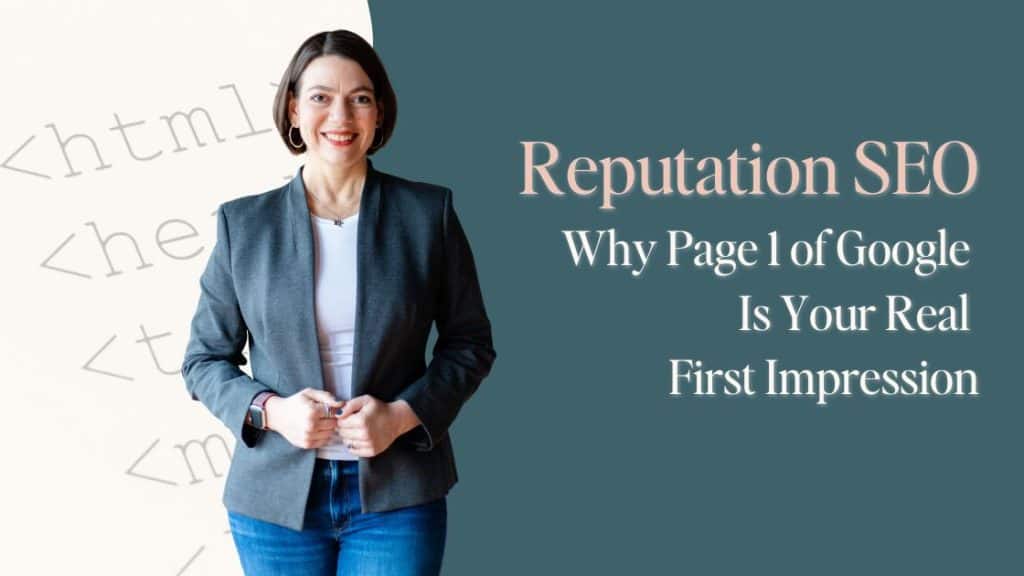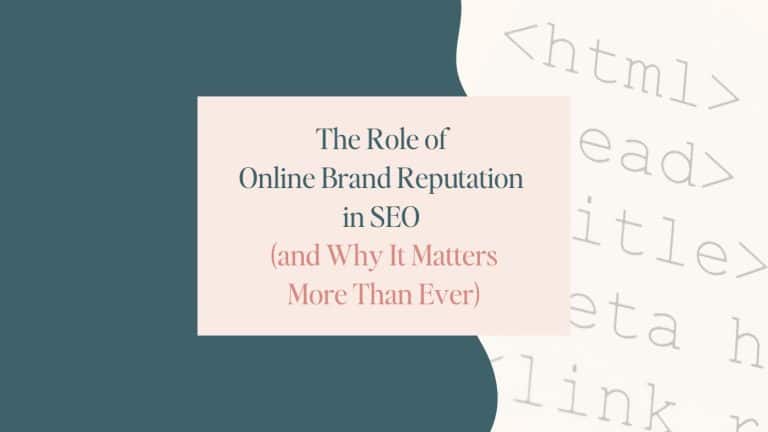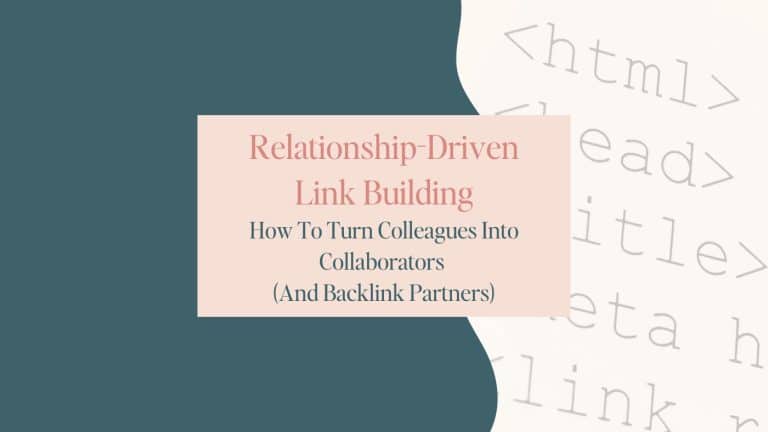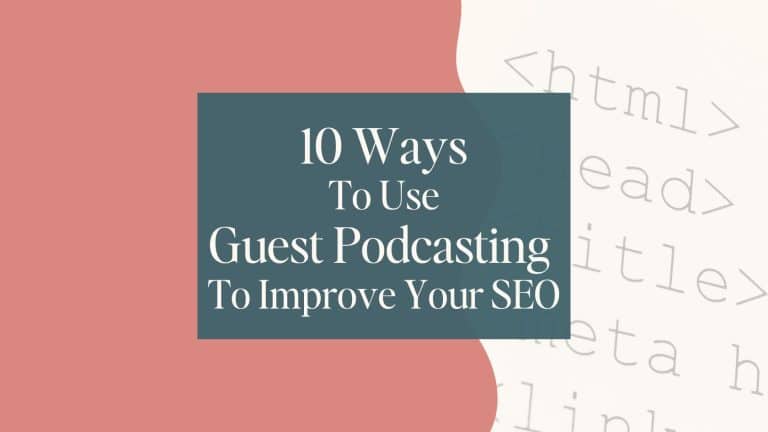
Future-proof your SEO strategy by creating content your audience is actually searching for
SEO Simplified will help you identify the words your audience is typing into the search bar, so you can create content that connects with humans, not just search engines.
Subscribe to get your FREE Copy of the SEO SIMPLIFIED keyword research workbook.
Jump To:
When someone hears your name, they don’t immediately type in your website URL. They Google you.
And Page 1 of Google’s search results? That’s your real first impression. It’s the story Google tells about who you are and what you do.
Consider these numbers:
- 99% of people never click past Page 1[1].
- Nearly half have seen something in search results that made them decide not to do business with someone[2].
- On the flip side, 56% have been won over by what they found online[2].
Most business owners assume their Page 1 is “fine.” But fine doesn’t get you chosen. Fine doesn’t separate you from a competitor with stronger signals. Fine doesn’t win the client.
Reputation SEO changes this. It’s the strategic practice of curating what shows up when people search for you, making sure your digital first impression reflects the business you’re running today and the expertise you want to be known for.
What Is Reputation SEO?
Reputation SEO is the practice of curating the story Google tells when someone searches your name or business. It’s about making sure the right information shows up in the right order to build trust and drive action.
Where traditional SEO is about discovery, getting found for services and keywords, reputation SEO is about credibility. It ensures that once someone finds you, what they see gives them the confidence to take the next step.
It overlaps with online reputation management, but with a sharper lens: Page 1 of Google.
How Page 1 Gets Shaped
Page 1 isn’t random. Google’s algorithm favors certain types of results when someone searches for a name or business. The mix usually looks like this:
- Your website (owned content) This is your home base. If your site is optimized and Google trusts it, your homepage or key pages will likely claim the top spot.
- High-authority platforms LinkedIn, YouTube, industry directories, and established platforms carry weight. A complete LinkedIn profile or YouTube channel often ranks higher than smaller sites.
- Reviews and ratings Google Business Profile reviews, industry-specific review sites, and testimonials signal social proof. These often appear prominently for local businesses and service providers.
- Earned content Media features, podcast appearances, guest posts, and interviews on reputable sites. These third-party endorsements carry significant authority in Google’s eyes.
This tells us something important: the easiest way to influence Page 1 is to strengthen the kinds of assets Google already trusts.
That means:
- Keeping your website updated and aligned with what you actually do today.
- Claiming and optimizing profiles on platforms that Google consistently surfaces.
- Collecting and showcasing reviews.
- Saying yes to visibility opportunities like podcasts, articles, or collaborations.
Consistency ties it all together. When your name, title, headshot, and bio match across platforms, Google is more confident they all belong to you.
How Does Reputation SEO Support Website SEO?
Reputation SEO and website SEO aren’t separate strategies. They’re two sides of the same coin.
Google evaluates your website’s trustworthiness partly based on what exists beyond your site.
Reviews, media mentions, social profiles, and backlinks from reputable sources all serve as external validation that you’re legitimate and worth ranking.
Think of these “off-page” signals as reference checks. When Google sees consistent mentions of your name or business across multiple credible platforms, it builds confidence in your site’s authority.
A website with strong external signals will typically rank better than an identical site with weak or missing external validation.
This is why some businesses struggle with search engine optimization despite having great content and technical optimization. Their website exists in isolation: no reviews, no mentions, no broader digital footprint to back up their claims.
Reputation SEO fills this gap. When you build a presence on LinkedIn, earn media coverage, collect client reviews, or appear on podcasts, you’re not just improving your Page 1 story. You’re also strengthening the foundation that supports your website’s search performance.
The relationship works both ways: reputation SEO makes your site more trustworthy to Google, and your optimized website confirms the expertise your reputation suggests.
How Does Your Website Back Up Your Reputation SEO?
Here’s where many businesses drop the ball: they build a strong Page 1 presence, but their website doesn’t deliver on the promise.
Someone sees impressive search results—great LinkedIn profile, recent podcast appearance, solid reviews—and clicks through to your website. If what they find is unprofessional, out-of-date, or simply doesn’t clearly explain what you do, that momentum sputters.
You need an “authority website” to match the reputation that Page 1 projects.
Key website elements that support your reputation:
- Clear service descriptions Visitors should immediately understand what you do and who you help. Vague and abstract language kills conversions.
- Strong calls to action Make it obvious how someone can work with you. Don’t make them hunt for next steps.
- Client testimonials and results Back up your expertise with evidence. Social proof on your site should reinforce what people saw in your search results.
- Consistent branding and messaging Your site should feel like a natural extension of your LinkedIn profile, media mentions, and other Page 1 content.
If your reputation signals say “established expert” but your homepage looks like it belongs to someone who got their MBA from Google University, people will notice and they’re less likely to stick around and further engage.
On the other hand, when your website is professional and reinforces the authority Page 1 projects, with clear service descriptions, strategic calls to action, and social proof that backs up your expertise, you’re more likely to convert Page 1 curiosity into actual business inquiries.
Page 1 Is the First Step, Not the Finish Line
Page 1 isn’t the end goal, it’s the starting point of how people decide whether to work with you.
Research shows most people need around 7 hours, 11 touchpoints, and 4 platforms before they’re ready to buy[3]. Page 1 is where that journey usually begins.
If what people see there doesn’t give them enough to work with, they may never move past hour one.
Think about it: someone hears your name at a networking event or sees you mentioned in a Facebook group. They Google you. What they find on Page 1 determines whether they bookmark your site, follow you on LinkedIn, sign up for your newsletter, or simply move on.
A thin Page 1, just your website and maybe a basic LinkedIn profile, doesn’t provide enough substance to carry someone through that research process. But a robust Page 1 gives them multiple ways to engage: your latest blog post, a recent podcast interview, client reviews, and active social profiles.
Each touchpoint builds your “know, like and trust” factor. By the time they’re ready to reach out, they already feel like they know you and your work.
Reputation SEO ensures Page 1 provides enough substance and opportunities to engage so potential clients keep leaning in, rather than clicking away after a surface-level look.
Why Does Reputation SEO Matter For Your Business?
Reputation SEO isn’t crisis prevention. It’s proactive business development.
When someone’s deciding between you and a competitor, they’re not just comparing services and prices. They’re comparing reputations. The person with stronger, more consistent search results typically wins, even if their actual expertise is similar.
A clear, robust Page 1 presence becomes a competitive advantage. While your competitors leave their search results to chance, you understand what influences Page 1 of Google search results and you’re strategically building the story that gets you chosen.
The business impact compounds over time. Strong reputation SEO supports stronger website SEO, which leads to better visibility for your services, which creates more opportunities for people to search your name, which strengthens your online brand reputation signals even further.
This creates what I call the “visibility loop”:
🔄 Your website ranks better because your reputation is strong.
🔄 Your reputation gets stronger because more people find and engage with your content.
🔄 More people engage because your website clearly communicates your expertise.
The businesses that understand this connection—between reputation, website performance, and conversions—will outperform those that treat SEO as just a website optimization task.
Take Control of Your Page 1 Story
Page 1 isn’t something to leave to chance. If you want to make sure thapeople find the right version of you and feel confident reaching out when they do, you need to be intentional about what shows up there.
That’s exactly what I teach in the Search-Ready Reputation Sprint. In five focused lessons, you’ll:
- Audit what’s showing up now and clean up what’s outdated.
- Highlight the signals that build trust and credibility.
- Create new visibility on platforms Google’s algorithm prioritizes.
- Put simple systems in place so your Page 1 keeps working over time.
👉 Turn Page 1 of Google into a first impression that actually wins clients. Search-Ready Reputation gives you the step-by-step process to do it.








